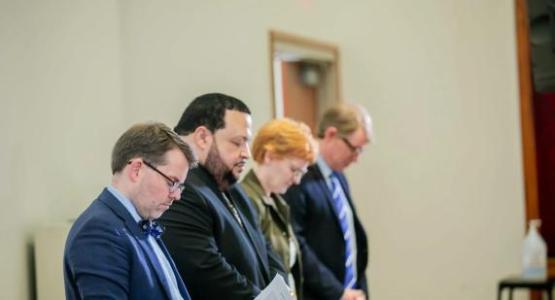
Identity and Dialogue: Unveiling the Spectrum of Seventh-day Adventism at the 2024 Keough Conference
Story by Giovanni Torrente
Washington Adventist University (WAU) hosted the 2024 Keough Conference on March 15-16, under the leadership of Dr. Hemmings, chair of the Religion Department. The event brought together experts on the WAU campus to explore the question, “Who is a Seventh-day Adventist?”
The conference featured keynote speaker Dr. Michael Campbell, director of Archives, Statistics, and Research at the North American Division of Seventh-day Adventist. Other panelists included Dr. Timothy Golden, a history and philosophy professor at Whitman College; Colette Newer, associate director of Adventist Community Services at the North American Division of Seventh-day Adventist; Dr. Daniel Bediako, associate director of the Biblical Research Institute of the General Conference of Seventh-day Adventists; and Dr. Nicholas Miller, a professor of law and religion at the Honors College of Washington Adventist University and senior research professor of church history at the Seventh-day Adventist Seminary at Andrews University.
Over two days, the speakers delved into the identity and culture of Seventh-day Adventists, considering their historical context and social differences. The Religion Department of WAU selected the topic to gather solid information on the community’s varied behaviors throughout history.
“The ideological spectrum of Adventists varies from people who allow politics to inform their faith to those who allow their faith to inform their politics,” Hemmings said. She noted differences in approaches to the Sabbath and jewelry, raising questions about the lifestyle of a Seventh-day Adventist.
Campbell emphasized education within the Adventist community, highlighting the role of conferences in fostering dialogue and scholarship. He noted diverse views on who qualifies as an Adventist, stressing discussions rooted in Scripture and focused on Jesus Christ. Campbell also touched on the Adventist tradition of social reform, mentioning social issues, the conflict in Ukraine, the Israel-Palestine situation, and environmental concerns.
“All of these issues showcase how our world is changing, and yet, the Adventist message and commitment to ‘present truth’ has never been more relevant,” Campbell said.
He encouraged Washington Adventist University students to embrace continuous learning and critical thinking: “Always keep learning! This was a catalyst behind our earliest pioneers who studied the Bible for themselves—similar to the Bereans—and this is the heart and core of Adventism at its best.”
Hemmings concluded: “We couldn’t deal with every aspect due to the small amount of time, but if you don’t know where you are coming from, you should tune into this lecture. The way for self-understanding is always winding, as Adventism is not a monolithic entity, but if we don’t seek an answer, someone else will look for it instead of us.

Add new comment